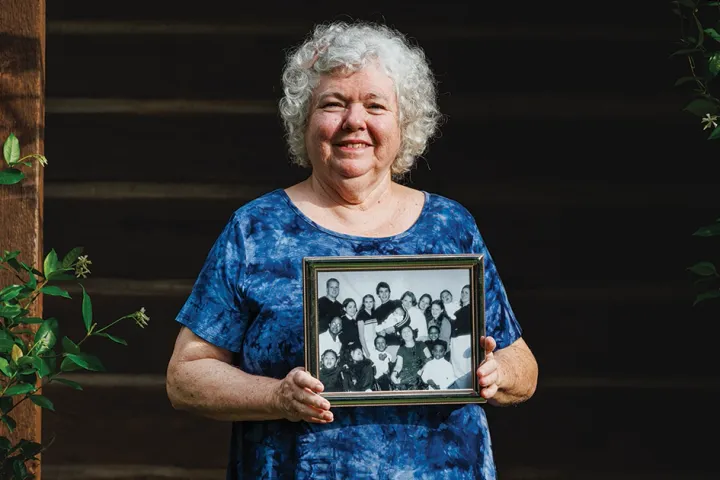The first time my mother-in-law and I had a real conversation, I was driving her to the hospital to see her husband, who’d just been diagnosed with leukemia and declined treatment. I drove feigning confidence, as if I knew which building, which parking deck, which wing was the right one.
 Illustration by Eleni Debo
Illustration by Eleni Debo
Through bits of English and Google Translate, she told me everything would be okay, citing a verse from Revelation. Was she trying to comfort me or herself? Either way, I wasn’t sure I agreed with her. Perhaps she possessed a clarity about the situation, some insight I lacked. My mind was swimming with missed work deadlines, the mental echoes of sick baby cries, and thoughts like Ugh, we don’t have anything to eat for dinner again. What we both knew for certain was, her husband was a stubborn, stoic man and that he would die from this cancer.
He would die and she would be left alone in the home they’d shared—a 435-square-foot condo that was the best home we could afford to give them. Alone and unable to drive. Alone with no way to buy groceries or get to church. He would die and she would lose her driver, translator, financial advisor, and closest companion.
Everything would not be okay.
***
I’d assumed early on that my in-laws would probably live with us one day. They never had much, and my husband has plenty—including an extra dose of that eldest son responsibility.
I’m not sure why the prospect never concerned me. Maybe it was because I knew his parents had given up everything in their home country, hoping their children could be successful in this one. Maybe because I knew they’d experienced things many adults would consider humiliating, including harassment, and I wanted to bring them healing somehow. Maybe because I loved their son and wanted to support him. Or, maybe it was the fact that move-in day always seemed far off.
Two months after that fateful drive (and four years into our marriage), my father-in-law died in that tiny condo. And a couple of weeks later, my mother-in-law moved into the “guest” bedroom in our home.
***
At first, she stayed in her room. Was it grief that kept her there? Or the fact that she felt out of place in her son’s home, living with a woman she barely knew?
Eventually, she started to linger after dinner to clean up the kitchen. Or come out to greet my daughter after daycare. Or wipe down the highchair after a messy snack. And before I knew it, my mother-in-law had become my personal fairy, tying up all the loose ends that so often fall to a working mother: putting trash in the garbage can while I cooked, moving a dirty dish to the sink, putting away a forgotten toy. I’d be sitting on the floor with my daughter and suddenly feel my hair being braided. Or if my husband mentioned I had a headache, there would be fingers circling pressure points on my head and neck.
Before this, I’d been trying to balance work, marriage, and time with my daughter—whose development I couldn’t keep up with, and it made every day like a wild expedition. At night I’d plop down on the bed absolutely tattered, wondering how I’d made it through another day.
One month into the new arrangement, I was pregnant again, and the first trimester exhaustion and sickness tore through the house like an unexpected gale, upending what little normalcy was left after my father-in-law’s death. I struggled to keep up, but my mother-in-law didn’t. I will always remember the days she met my eyes and said with conviction, “Go take nap.”
And what made me feel just plain spoiled was when she’d get up to soothe my sick, crying daughter in the middle of the night. My husband and I were so, so tired, and I couldn’t believe I had someone who would weather nights like those on my behalf.
But now that she’s with us, the thing that looms over me is, What will life look like in her final days? Maybe she’ll age comfortably, but what if she doesn’t?
***
Earlier this year I had the honor of meeting her mother, who is 90-something years old and lives with a granddaughter. My grandmother-in-law is a delight—and a challenge. During our visit my husband and I would listen to her yell at the TV at odd hours of the day, switching haphazardly between Chinese and Japanese. One time she burst into our room while we were sleeping and turned on all the lights. Another time, she yelled nasty things at the granddaughter for not allowing her to visit a sister who has been dead for years.
Is that my future? I wondered. And if not, will it simply be some other difficult version of that story? There are many uncomfortable ways to grow old.
But as forbidding as that reality could one day be, I know there will be a richness too. I know it when I watch my newly widowed mother-in-law and daughter laugh together, making silly faces across the dinner table. No amount of granddaughter giggles will bring her husband back to life, give her a house of her own, teach her how to drive, or manufacture confidence with English speakers. But the laughs do make her smile. They do make days a little brighter.
If living with my mother-in-law has taught me anything, it’s that where things are threadbare, they’re threadbare. There’s no camouflaging the fact that time can be ruthless, stripping away safety and comfort. But there’s also abundance—and not in a check-the-thankful-box kind of way. There’s a real, luxurious richness, moving alongside desolate parts of our lives. The holes in our hearts remain, but flowers grow around them.
Jesus said, “Blessed are those who mourn, for they will be comforted” (Matt. 5:4)—not “Blessed are those who mourn, for one day they will be comforted”—and I believe Him. The healing is here and now. We don’t have to wait until our lives are over to receive it. And His words ring true every time I watch my grieving mother-in-law teach my daughter Mandarin.





